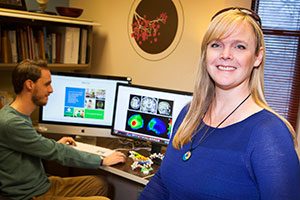Enrollment of nearly 12,000 youths, ages 9 and 10, in a landmark study of brain development and child health is now complete, the National Institutes of Health announced today. A researcher from the University of Wisconsin-Milwaukee is overseeing the collection of data from 384 Wisconsin participants in the Adolescent Brain Cognitive Development study, the largest study of its kind in the United States.
The ABCD study is expected to increase understanding of the environmental, social, genetic and other biological factors that affect brain development and can enhance or disrupt a young person’s life trajectory. UWM is one of 21 sites across the nation collecting data from area schoolchildren in the study during the next 10 years.
In early 2019, scientists will have access to the baseline data from all participants. There are 11,874 youths participating in the study, including 2,100 young people who are twins or triplets. All will be followed through young adulthood.

Data are collected on a semi-annual and annual basis through interviews and behavioral testing. Advanced neuro-imaging data are collected every two years to measure changes in brain structure and function, said Krista Lisdahl, an associate professor of psychology who is heading up the UWM site.
Scientists can already begin using the baseline assessment data. They can investigate the impact of certain behaviors, such as sleep, physical activity and even screen time exposure, on brain development. Also, they can look at risk and resilience factors for mental illness and substance use. Tracking those factors over time can help them better understand these complex relationships with the goal of finding interventions.
Participants from Wisconsin came from schools across several districts in Waukesha and Milwaukee counties, including Wauwatosa, Shorewood, Menomonee Falls, Richmond/Sussex, Pewaukee, West Allis/West Milwaukee, Glendale/River Hills, Brown Deer, and several charter/private schools in Milwaukee.
“We are deeply grateful to the superintendents and principals of these districts and schools for their collaboration during the enrollment phase and look forward to disseminating findings from the project back to the districts in the years to come,” Lisdahl said.
Coordinated by the National Institute on Drug Abuse and the National Institute on Alcohol Abuse and Alcoholism, the study is supported by eight other NIH institutes and offices, as well as the Centers for Disease Control and Prevention and other federal partners.







